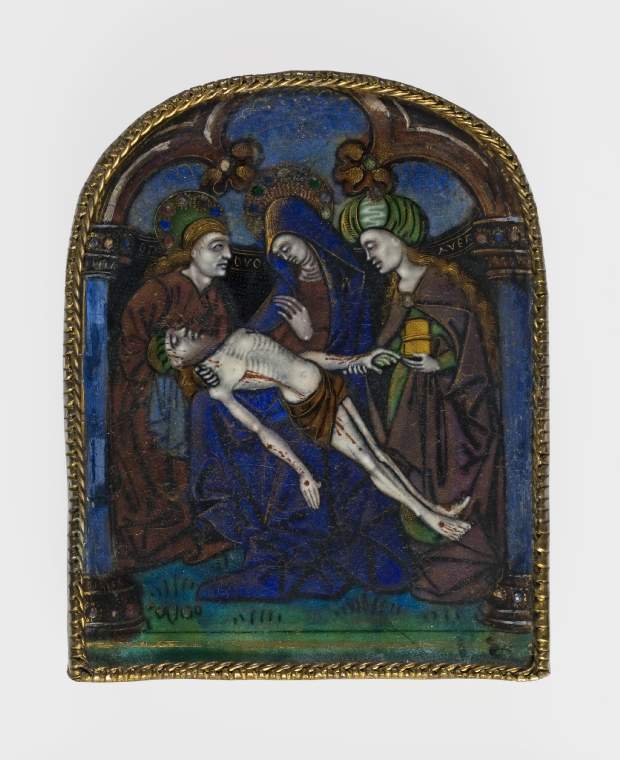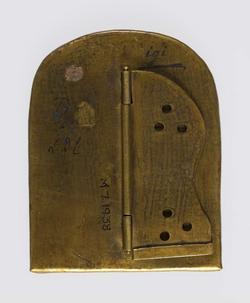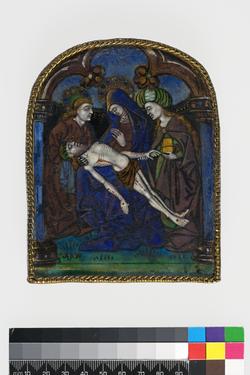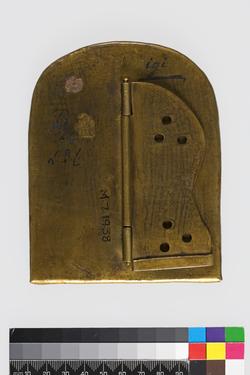Current Location: In storage
Titles
Pieta with St John and St Mary Magdalene
Maker(s)
Maker:
Master of the Orléans Triptych
(Probably workshop of)
Entities
Categories
Description
Copper, decorated with polychrome enamels, foiled 'jewels', and gilding
Rectangular, almost flat copper plaque with arched top, the white preparation enamelled in blue, green, yellow, brownish-mulbery, pale purple, a little red, black and white and gilded. The drawing appears black through the white preparation. The flesh is white over black with a pale mauve wash applied over parts of the faces and limbs.The circular jewels are foiled with presumed silver paillons. The surface is slightly rippled and almost mat.The counter-enamel is not visible.
The Virgin Mary is seated in the centre, looking down at the dead Christ who lies across her knees with his right arm hanging down, and his left extended but only partly visible. The Virgin’s right hand is raised, and she supports Christ’s right shoulder with her left hand. Christ’s left hand is held by Mary Magdalen, who stands on the right holding a jar of ointment in her right hand. St John stands on the left looking towards the others. Both he and the Magdalene are shown three-quarter view with their heads in profile.
Christ wears a green head band and a brown cloth round his loins. The Virgin has a mulbery halo with gold rays and eight alternately green and blue jewels. She wears a dark blue cloak over a mulbery gown. Mary Magdalene has waist-length pale brown and gold wavy hair, and wears a green turban-like cap, and a pale purple cloak over a green dress. St John has shoulder-length golden hair, and a green halo with six alternately mulberry and blue jewels. wears a mulberry gown and has a pale blue cloth over his right arm. All have white flesh shaded in grey.
Behind the figures is a niche with a trefoil arch rising from cylindrical columns with carved capitals and bases. The columns are blue and have three jewels on their capitals and two on their bases. The trefoil arch has a jewel on a trefoil on the two angles. The words ‘O(insert a large n) OVO AVER’ are inscribed in gold on the wall of the niche. The lower part is scattered with gold dots over a black ground. The area within the trefoil arch is blue.
The plaque is set into a gilt-metal frame with a wire rope edge on the front partly covered by teeth folded over from the back which hold it in place. The frame covers the reverse completely and has a vertically hinged prop, pierced by two groups of three holes. It is inscribed in black on the left B/55/L.D.C, and on the right 'igi' underlined, and lower down '615' on a tabula ansata with 'Ic.' (dot above I) above and below
Notes
History note: Perhaps Edmond Bonnaffé, Paris. M. Joubert, probably Félix Joubert (1872–1953), The Pheasantry, 152 King’s Road, Chelsea, London, from whom purchased probably on 17 November 1930 for £50 by Leonard. D. Cunliffe (1860–1937); bequeathed by him.
Legal notes
L.D. Cunliffe Bequest, 1937
Acquisition and important dates
Method of acquisition: Bequeathed
(1938-02-15)
by
Cunliffe, Leonard Daneham
Dating
16th Century, Early
Production date:
circa
AD 1500
: When acquired, the plaque was dated to c. 1480, but it probably dates from around 1500. Its authenticity has been doubted but the degree of damage to its edges suggests that it is probably genuine, but heavily restored.
Note
Plaques of this arched form were sometimes used as paxes, but few have retained their handle. Others were set into small free-standing frames, or were framed and hung at the head of the owner’s bed, as an image de chevet.
The composition is closely related to a Pietà in the Hermitage, St Petersburg, which has a similar iconography but with a tau Cross and landscape in the background, and was attributed to the Master of the Orleans Triptych by Marquet Vasselot. (see Documentation). It differs from the Fitzwilliam’s in three other iconographical details: the Magdelene has a jewelled halo, St John is shown three-quarter face instead of in profile, and there is a flower near the lower left corner. Another plaque in the Hermitage has analogous icongraphy and was alsoformerly attributed to the Master of the Orleans triptych. (see Documentation, Rappé and Boulkina, 2005). A plaque of this subject, presumably deriving from a shared source, but much more naively delineated, and with the group in a room with an ogee arch above is in the Louvre, OA 4011 (see Documentation, Baratte, 2000). All four plaques have a Mary Magdalene who wears a turban-like cap, fashionable in the mid to late 15th century, which distinguishes them from another series of plaques on which she it hatless and vaseless. She also appears in this way on the right wing of a triptych by the Master of the Orleans Triptych in the Hermitage (F 275), and in the Crucifixion forming the central panel of the triptych attributed to the workshop of Nardon Pénicaud at Bourges. This type of headdress went out of fashion by the early sixteenth century but continued to be worn by Mary Magdalene in works of art in which she was not depicted with her hair hanging loosely about her shoulders.
The unidentified enameller known as the Master of the Orléans Triptych was named by J.J. Marquet de Vasselot in 1921 after a triptych which had been given to the museum at Orléans in 1825.
School or Style
Renaissance
People, subjects and objects depicted
Components of the work
Decoration
composed of
enamel
( blue, green, yellow, brownish-mulbery, mauve, a little red, black and white)
gilding
Frame
composed of
gilt-metal
Height 12.6 cm
Width 10.1 cm
Plaque
composed of
copper
Inscription or legends present
Inscription present: underlined
- Text: igi
- Location: On back at top right
- Method of creation: Hand-written, probably in black Indian ink
- Type: Inscription
Inscription present: possibly with a V in front of the first Ic.
- Text: '615' on a tabula ansata inscribed with ‘Ic.’ (dot above I) above and ‘Ic.’ below
- Location: Half-way down the right of the back
- Method of creation: Hand-written, probably in black Indian ink
- Type: Inscription
- Text: B/55/L.D.C
- Location: On left side of back
- Method of creation: Hand-written in black
- Type: Inscription
References and bibliographic entries
Identification numbers
Accession number: M.7-1938
Primary reference Number: 156453
Stable URI
Audit data
Created: Saturday 6 August 2011
Updated: Tuesday 30 April 2024
Last processed: Tuesday 13 May 2025
Associated departments & institutions
Owner or interested party:
The Fitzwilliam Museum
Associated department:
Applied Arts

 IIIF Manifest
IIIF Manifest






